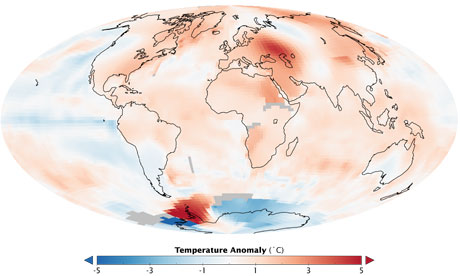Scientists have a duty to engage with the public on climate change
Scientists have not been effective communicators, but it's time we made the effort to fight bad information
by John Abraham, The Guardian, November 8, 2010

Two new campaigns have been launched by scientists that aim to improve the communication of climate science. One effort is the American Geophysical Union's 700 scientists who are on staff to answer questions centered around the Cancún climate conference. Another initiative is one that I am personally involved in, the formation of a "rapid response" team of scientists for media inquiries related to climate change. Scientists have not been effective communicators; these projects are our effort to get better.
The main motivation for forming the climate rapid response team is to provide high-quality information to the media and the public. Each year, the science supporting human-caused global warming gets stronger, as the consequences of climate change become more extreme. If we don't take meaningful action soon, we will be committed to significant environmental damage.
It is important for people to recognise that while this problem is complex,a lot is known about it. The vast majority of top climate scientists understand climate change is a serious threat – in fact, approximately 97% of the top climate scientists believe we have a problem. Though there is little disagreement, it is helpful to have scientists working to find fault in the science. However, the public should know that the handful of scientists who disagree have not, in more than 20 years, been able to find a major fault in the science, and they have not been able to propose an alternative explanation for the marked warming of this planet.
On the other hand, the general public and members of government are split on this issue. Half are concerned about global warming, half are not. Why is that? A major reason is that there is a great deal of bad information which typically germinates in the blogosphere and is created by people with little or no real expertise.
We know that solving this problem will require real effort. We are on a path to cause real destruction to our planet, and even if we were only interested in self-preservation we should take action.
We are also not naive in recognising that there is a political aspect to this. It is well known, at least in the United States, that conservatives tend to be much more sceptical about climate change than liberals. We need to move beyond partisanship toward co-operation. Conservatives care about the environment, too, and there have been many who have made comments about the need to act on climate change. History will look unkindly on those who have stood in the way of saving the planet, which will be an enormous political liability – although by then it will be too late to fix things.
The timing of these campaigns was not linked to the recent elections in the US The American Geophysical Union's effort coincides with the Cancún climate conference, a timing that is primarily motivated by a recognition that scientists have an obligation to defend the science and engage with the public.
We are both scientists and human beings. As scientists, we need to find ways to communicate accurate scientific information to a wider audience in a way that is policy-neutral. As humans, we are concerned not only for ourselves, but also for our children and for people in the world who don't have the necessary resources to adapt to the coming change. As a human, I have an obligation to speak up for them.
It is a shame that scientists have to take personal and professional risks in order to be good citizens of the planet. It doesn't have to be this way.
• John Abraham is associate professor in the school of engineering at the University of St Thomas in Minnesota







No comments:
Post a Comment